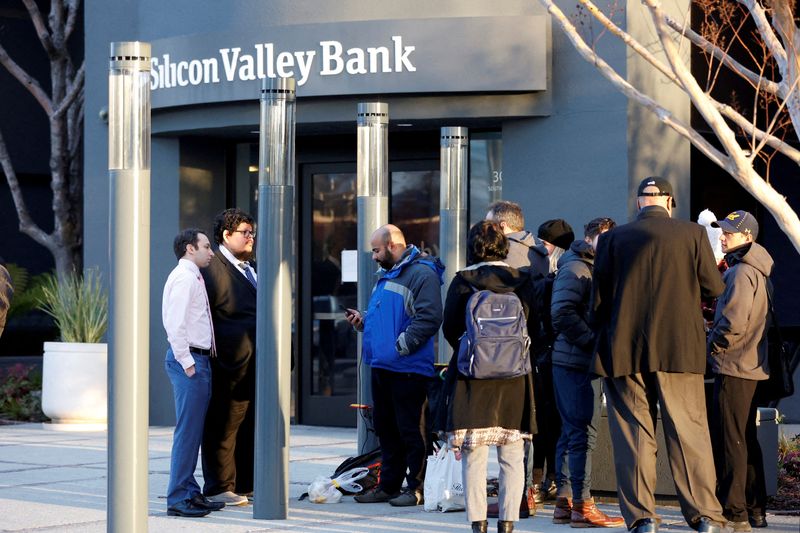By Hannah Lang
WASHINGTON (Reuters) -The speed at which depositors fled Silicon Valley Bank this month - withdrawing $42 billion in 24 hours - has left authorities confronting a new risk: the social media-driven bank run.
Gone are the days when lines of people outside banks served as the defining image of a lender on the brink. In today's turbocharged digital age, customers can withdraw cash through a few taps on their phone.
Reports on social media during the week of March 6 that some venture capital firms, including influential investor Peter Thiel's Founders Fund, were advising companies to pull cash from tech-focused SVB snowballed into a stock rout and sent customers scrambling for the exit. Authorities shut SVB on March 10.
Switzerland's Credit Suisse, which on Sunday had to be rescued by archrival UBS in a government-engineered takeover following a collapse in investor confidence, knows only too well the dangers of social media. Last year it breached liquidity requirements at some of its entities after an unsubstantiated social media report sparked client exits.
"The fact that people can communicate so much more quickly ... (has) changed the dynamic of bank runs and perhaps changed the way we have to think about liquidity risk management," said Todd Baker, a senior fellow at Columbia University's Richmond Center.
Billionaire hedge fund manager William Ackman warned a few days after SVB's collapse that "no bank is safe from a run" in a world with online bank accounts and social media unless the government gives depositors an explicit guarantee of "complete access" to all of their cash.
Regulators know they are battling against the potential for bank runs to unfold faster than ever, although how they can specifically address the risk of Twitter-fueled panic is unclear.
In the U.S., the decision to insure all bank deposits after SVB was shuttered surprised many. Experts said it showed authorities were sufficiently concerned about depositors withdrawing cash from other lenders.
"It's possible that the issue is that deposits have never moved so fast and that is what formed the basis of this decision – the outflows at SVB were without equivalent," said Nicolas Veron, senior fellow at the Peterson Institute for International Economics in Washington.
QUICKLY DISAPPEAR
Some in the banking industry play down the risks of another SVB-style downfall spurred by social media.
They point to SVB's unique vulnerability to a social media-driven bank run, given its highly concentrated customer base of technology and venture capital entrepreneurs who mingled in the same circles.
"This was a center of influence, and that was concentrated in this ecosystem, unlike it is in other areas," said Randell Leach, chief executive officer of California-based Beneficial State Bank.
Still, some depositors across the globe are taking no chances even when they believe their bank is fundamentally sound.
One biotech investor in Germany who banked with Credit Suisse and spoke before Sunday's rescue deal said he had shifted his personal deposits to another institution even though he thought Credit Suisse was a "good bank." SVB had shown how quickly deposits can disappear, the investor said.
Dan Awrey, a law professor at Cornell University, blamed the fallout from SVB on an "absence of a communications strategy."
Between the Friday morning SVB collapsed and the end of the weekend regulators should have explained the bank had a unique business model and other lenders were not as risky, he said.
Failure to do this caused depositors elsewhere to worry their funds were in danger, exacerbating stress in the system, Awrey said.
"All of that was just lacking between Friday morning and Sunday in a way that allowed the Twittersphere to really take hold of the information dynamic and the narrative," he added.
Other U.S. regional banks have since come under pressure, with First Rebublic Bank's share price diving 47% on Monday on concerns about its liquidity.
The SVB saga and nonstop social media speculation could eventually lead to banks providing round-the-clock service, including on weekends, said Jez Mohideen, CEO of Laser Digital, the cryptocurrency arm of Japanese bank Nomura.
Regulators will also need to monitor social media and develop a set of protocols to guide how they respond, according to Patricia McCoy, a law professor at Boston College.
"They need to be looking for any signs of unsubstantiated rumors, panic starting to mount on social media, and they've got to do it around the clock," she said.
